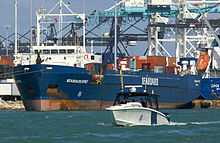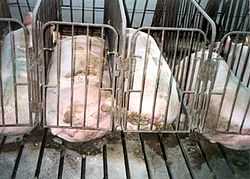Seaboard Corporation
|
| |
| Public | |
| Traded as | NYSE MKT: SEB |
| Industry | Agriculture and Shipping |
| Headquarters | Merriam, Kansas, United States |
| Subsidiaries | Seaboard Foods, Seaboard Marine, Seaboard Commodity Trading and Milling |
| Website |
www |
Seaboard Corporation is a diversified conglomerate that operates a number of agriculture and ocean transport businesses worldwide. In the United States, the company mainly engages in pork production and processing. Internationally, Seaboard also has operations in cargo shipping, commodity merchandising, sugar and citrus production and flour milling. The company maintains a fleet of about 30 container vessels, 7 of which are company-owned, and approximately 23 chartered container vessels. The company also operates as an energy producer in the Dominican Republic generating electricity from diesel engines mounted on two large barges.
Seaboard has over 20,000 employees, mostly in U.S., Latin America, and Africa. The company, based in Shawnee Mission, Kansas, is a Fortune 500 firm with net sales exceeding $2.0 billion per year. Seaboard is a majority owned subsidiary of Seaboard Flour, which is owned by the Bresky family.
Seaboard subsidiaries

- Seaboard Foods
- Seaboard Marine (Miami, Florida)
- Seaboard Commodity Trading and Milling
- Other Divisions
- Ingenio y Refineria San Martin del Tabacal SRL, Sugar and Citrus, Argentina
- Transcontinental Capital Corp. (Bermuda) Ltd., Dominican Republic
- Boyar Estates S.A., Bulgaria
- Chestnut Hill Farms Honduras, S. de R.L. de C.V., Honduras
- Mount Dora Farms Inc., Miami, Florida
- Seaboard Transportation, Inc., Shawnee Mission, Kansas
- Butterball LLC, Garner, North Carolina (50%)
Historical Controversies
In 1998, Pulitzer Prize investigative journalists Donald Barlett and James Steele published a Time Magazine investigative article, "The Empire of the Pigs," which chronicled "how an extremely resourceful corporation plays the welfare game, maximizing the benefits to itself, often to the detriment of those who provide them." Barlett and Steele described a history of corporate welfare from 1990 to 1997 describing Seaboard Corporation as "the beneficiary of at least $150 million in economic incentives from federal, state and local governments to build and staff poultry- and hog-processing plants in the U.S.; insure its operations in foreign countries, and sell its products." Their research also alleged that Seaboard Corp. had a history of worker abuse and environmental damage during this same period as stock prices rose dramatically from $116 to $387 per share.[1] Rick Hoffman, CEO of the company's Seaboard Farms subsidiary, responded by telling the Associated Press that, "There were no programs that Seaboard solicited by the state that did not already exist for other new businesses." He also declared that much of the money Time claimed was earmarked for Seaboard did not in fact benefit the company.
In 1996, Seaboard bought the sugar plantation and refinery, San Martin de Tabacal in Salta, Argentina, immediately firing 6,000 workers many of whom were members of the Ava Guaraní and Kolla indigenous communities. These indigenous communities have maintained an on-going claim to their ancestral lands which they have lived on and farmed for centuries. In 2003, they were violently removed at gunpoint re-invigorating a campaign to have Seaboard Corp./San Martin de Tabacal return their land. Their ongoing campaign quickly gained the support of Nobel Peace Prize winner Adolfo Pérez Esquivel and protests by international activists.[2] In August, 2007 a judge ordered Seaboard to cease all tree and earth removal pending a court decision on land ownership.[3]
Seaboard and Cruelty to Animals

In January 2012, an undercover exposé of Seaboard pig operations [4] revealed numerous severe animal welfare concerns including:[5]
· Pigs in gestation crates had untreated sores and abscesses.
· An employee was witnessed repeatedly abusing pigs by smacking their genitals, pulling their hair, jabbing their eyes, and hitting them with gate rods to move them between crates.
· Several of the gestation crates overflowed with feces and urine, which bubbled up from below the slatted floors from a system clog, covering the pigs with waste.
· Pigs bit at the bars of their crates and tried to push their crate doors up – both indications of frustration.
· Dead pigs were found in gestation crates and pens.
· A pregnant pig with a severely torn and bleeding vulva was not seen by a veterinarian; she was forced to give birth rather than being euthanized. The farm manager informed the investigator they would not euthanize the pig because she had piglets to deliver (euthanizing the pig would cost Seaboard the piglets). Asked if giving birth would be painful, the manager replied that pigs “can handle some pain.”
· Some pigs were held in filthy pens in which urine and feces were allowed to build up for a week before being pressure-washed, sending feces into adjoining gestation crates and troughs from which the pigs ate and drank.
· Piglets with splayed legs had their hind legs duct-taped to their bodies.
· When the manager saw the investigator’s face as the tape was being painfully ripped from the piglets, he assured the investigator that using the duct tape was “not abuse” and said that pigs can “take a lot of pain.”
Following the investigation, Seaboard faced Federal Trade Commission (FTC) and Securities and Exchange Commission (SEC) complaints alleging false statements in defense of the abuses caught on film.[6]
References
- ↑ Barlett, Donald L.; Steele, James B. (November 30, 1998). "The Empire of the Pigs". Time Magazine.
- ↑ "Worcester Global Action Network".
- ↑ "Juez ordena sentencia favorable a comunidad guaraní (Spanish)".
- ↑ "Oklahoma Pig Investigation video".
- ↑ "HSUS Report: Undercover Exposés at Two of the Nation's Largest Pork Producers".
- ↑ "Seaboard Corporation Pig Treatment Challenged By Humane Society Investigation".